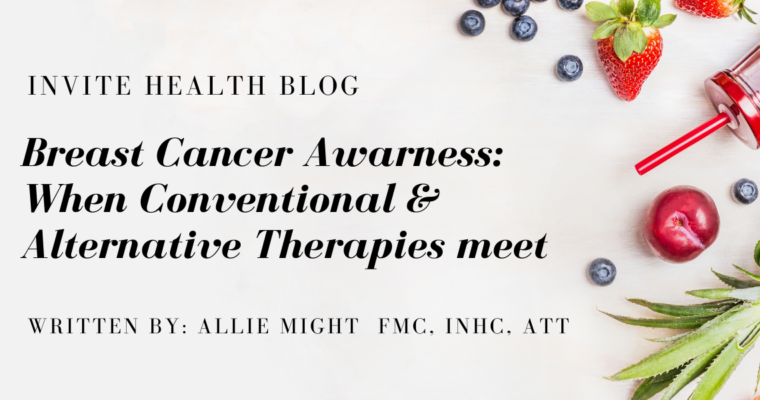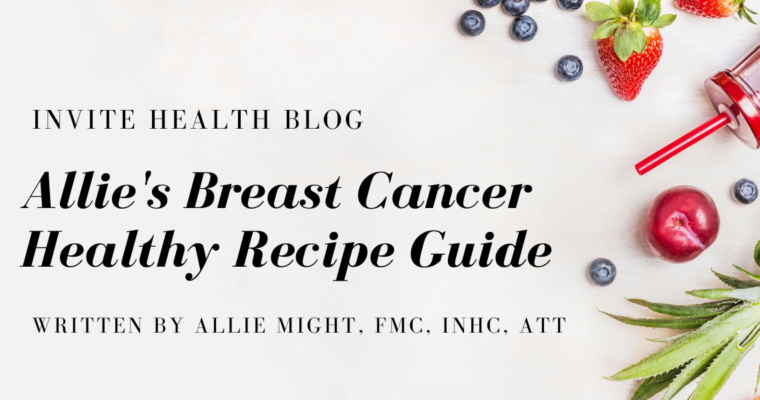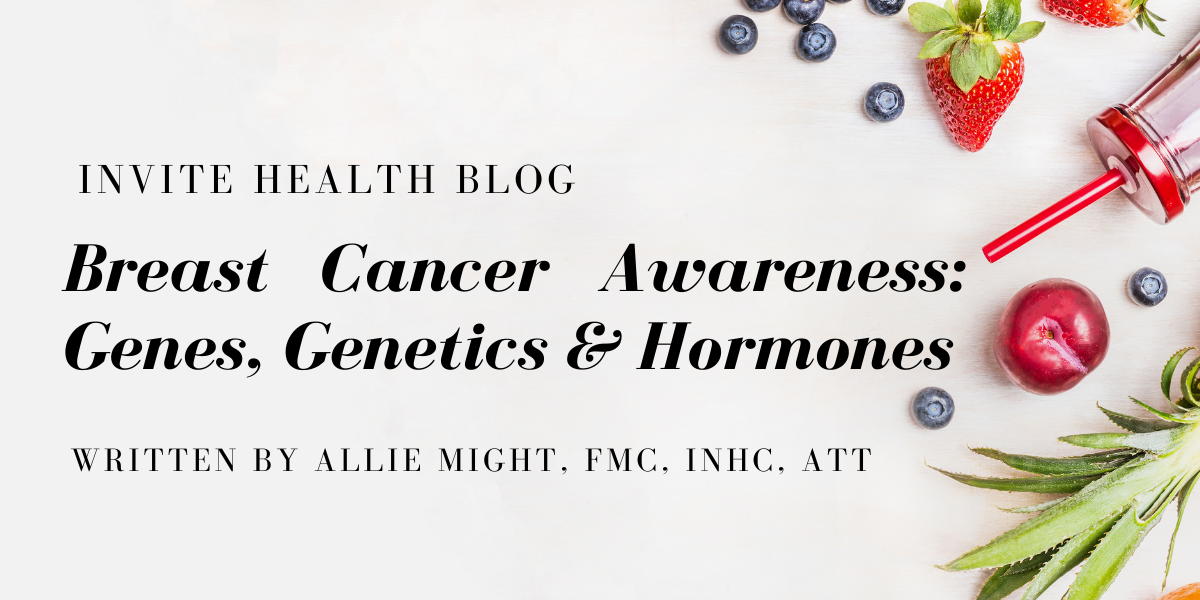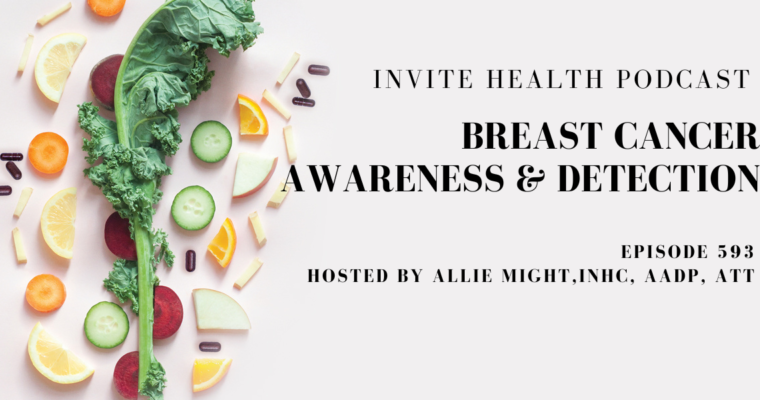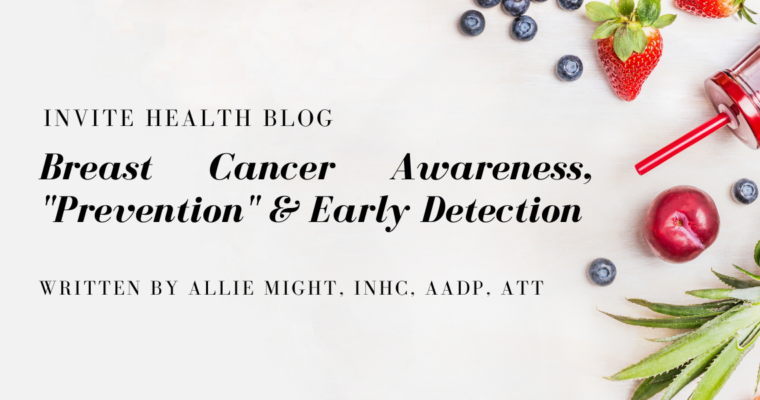breast
Targeted Nutrients to Support Breast Health
By: Kayanne McDermott, ND
For further questions or concerns email me at kmcdermott@invitehealth.com†

According to the World Cancer Research Fund International, Breast Cancer came up in top rank as one of the top 3 cancers in women worldwide in 2020 (1). In addition, breast cancer ranks second as cause for cancer related death in women (2). There are many possible contributing factors to the development of breast cancer, some could be due to genetics, environmental influence, iatrogenic, lifestyle influences & there’s a small percent of unknown cause. You may not have had breast cancer, or perhaps you’re a survivor or may know someone who may have had it, or currently fighting it now. You may have lost a mom, sister, aunt or loved one to breast cancer and you want to know if you can prevent it or lessen your chances of being diagnosed of having breast cancer. In this article, I’m going to discuss a little bit about breast cancer, the correlation with estrogen dominance, and what can be done nutritionally to support your immune system to withstand this terrible diagnosis and what can be done to lessen the risk of developing breast cancer.†
Breast Cancer is a type of cancer that starts in the breast, and cancer in general is abnormal cells that grows rapidly out of control(3). Breast cancer can be benign or malignant, there are subtypes and they can also be located in different regions of the breast, such as in the lobules, ducts, stroma and/or nipples, and depending on the location, they will be named as such, for example, if cancer is found in the ducts of the breast, it would be ductal cancer or in the lobes, lobular cancer. It’s not exactly that simple, but the name will give you an idea of the location of the cancer in the breast. Breast cancer can spread to the rest of the body when it gets into the lymph nodes or into the blood.†
Estrogen Dominance is when there’s an imbalance of the hormones, estrogen and progesterone. Progesterone can be too low, causing estrogen dominance or there can be an excess of estrogen due to gut flora imbalance, poor liver health, environmental toxicity due to xenoestrogens, and/or chronic stress. Not all breast cancers are created equal, therefore finding out which type of hormones influence the growth of breast cancer, determines the therapy. This can be done by getting a hormone receptor test. Therefore before taking any nutritional supplements, finding out the breast cancer type is imperative. However if you’re taking a preventative approach, then there’s no need for that test. There’s also a genetic test that can be done to check your susceptibility of developing breast cancer, given there’s a family history of breast cancer.†
THE GUT-ESTROGEN CONNECTION>>Read Now!
How can one manage breast cancer alternatively? Well, I wouldn’t recommend to rule out the conventional way of doing things completely, therefore I would suggest that you work with the oncologist that understands your view and preferences on treatment so that they can support you the best way they can with integrating both the conventional and non-conventional approach. In addition to having a diet rich in leafy green & cruciferous vegetables, organic berries, healthy fats and high fiber, employing some additional supplements may be helpful in supporting your efforts in combatting or preventing this dreadful diagnosis. When it comes to overcoming any forms of dis-ease, it takes mental, emotional & physical effort. I won’t get into emotional or mental today, however I will focus on what can be done nutritionally to support you.†
Indole-3-carbinol with Diindolylmethane (I3Cw/DIM) has shown to break down the estrogens your body doesn’t need so that they can be eliminated through your stool and/or urine. Studies have shown that these compounds has anti-estrogenic activity, and protects against tumor formation, (5). This is a naturally occurring compound that is found in cruciferous & brassica vegetables such as broccoli, cabbage, & brussel sprouts. Invite’s I3Cw/DIM provides support against the bad estrogens, enhancing estrogen metabolism and may prevent the development of estrogen-enhanced cancers such as breast cancer, (6).†
Green Tea, another potent “miracle” in a cup or in this case, bottle. Green tea contains many phytonutrients, antioxidants, catechins & polyphenols. Due to its (7)catechin content, studies have shown that Green tea has anti-cancer, anti-viral and antioxidants effects, inhibiting cancer cell proliferation (8). Epigallocatechin-3- gallate (EGCG), a powerful polyphenolic compound in green tea, has been studied to show apoptotic, anti-metastatic & anti-angiogenic effects when taken orally, (9). With such a study, one will want to get on the band wagon of drinking green tea daily, due to the outstanding benefits it holds.†
There’s so much that can be discussed about breast health and nutrition, however I’m going to just highlight one more nutrient that can be easily overlooked to be helpful for breast health. That nutrient is, Vitamin D! It’s mostly highlighted for bone, and immune health, however, Vitamin D can be very beneficial in supporting breast tissue. Every organ in our body has a Vitamin D receptor including the breast tissue. Vitamin D is obtained from the sun via UV rays through our skin then synthesized primarily, by the kidneys into it’s active form, 1-25 dihydroxy-Vitamin D3. Studies have shown that there’s a correlation between Vitamin D deficiency and increased risk of breast cancer, (10). According to The Journal of Steroid Biochemistry and Molecular Biology, when there’s a reduction of Vitamin D Receptor expression within breast cancer cells, this can accelerate tumor progression and enable metastases, (11). With having information like this, I highly recommend that you implement Vitamin D supplement into your daily regimen, including men. Men, may not have breast cancer, which men can attain as well, but that’s in the low percentile. You may not have abnormal breast tissue, nor any kind of abnormality, however taking Vitamin D3, should be that one vitamin that you do not go without as part of your daily regimen. There’s a saying that goes, “Prevention is better than cure.” Have your Vitamin D blood levels checked, so that you will know the amount you need to maintain optimal levels.†
NEW FINDINGS ON NUTRITION AND CANCER – INVITE HEALTH PODCAST, EPISODE 501>>Listen Now!
If you or someone that you know that may be experiencing or have had breast cancer or abnormal mammogram results, I suggest that you or they, implement the above supplements to enhance their prognosis. In addition, what you eat and consume on a daily basis goes a long way. Implement a lot of cruciferous vegetables, healthy fats, whole grains, tons of berries and exercise into your daily regimen. If you have a family history of breast cancer or any other reproductive abnormality, speak to your endocrinologist, Ob/Gyn, get the correct tests done and work with an Invite Health degreed professional to help you get on track.†
If you have any questions, concerns, you can email me at kmcdermott@invitehealth.com.
Resources:
1. https://www.wcrf.org/cancer-trends/worldwide-cancer-data
2. Mohammad Fahad Ullah. (2019). “Breast Cancer: Current Perspecitives on the Disease Status”. Advanced in experimental medicine and Biology. PMID: 31456179
3. Cancer.org. “What is Breast Cancer?”
4. Lynch, Ben ND. (2018). “Dirty Genes: A breakthrough Program to treat the root cause of illness and optimize your health.” 1st Edition. HarperOne, New York, NY.
5. Cover,Carolyn; S. Jean Hseih; Cram, J Erin; Hong, Chibo; Riby, Jacques E; Bjeldane,Leonard F; Firestone,Gary L. (1999). “Indole 3 Carbinol and Tamoxifen Cooperate to Arrest the Cell Cycle of MCF-7 Human Breast Cancer Cells”. American Association of Cancer Research; Experimental Therapeutics; Volume 59: Issue 6.
6. Karen J Auborn , Saijun Fan, Eliot M Rosen, Leslie Goodwin, Alamelu Chandraskaren, David E Williams, DaZhi Chen, Timothy H Carter. (2003). “Indole-3-carbinol is a negative regulator of estrogen.” Journal of Nutrition.
7. Tiantian Zhao, Chao Li,2 Shuai Wang, and Xinqiang Song. (June 2022). ” Green Tea (Camellia Sinensis): A Review of its Phytochemistry, Pharmacology, and Toxicology.” Molecules. Volume 27; Issue 12. PMCID: PMC9231383
8. Tommaso Filippini, Marcella Malavolti, Francesca Borrelli, Angelo A Izzo, Susan J Fairweather-Tait, Markus Horneber, Marco Vinceti. (2020, March 2). ” Green Tea (Camellia Sinensis) for the prevention of cancer.” The Cochrane Database of Systematic Reviews. PMCID: PMC7059963
9. Adriana Romano, Fátima Martel. (2021). “The Role of EGCG in Breast Cancer Prevention and Therapy.” Mini Reviews in Medicinal Chemistry. PMID: 33319659
10. Kay W.Colston PhD. (August 2008). “Vitamin D and breast cancer risk.” Best Practice & Research Clinical Endocrinology & Metabolism. Volume 22, Issue 4, Pages 587-599. https://doi.org/10.1016/j.beem.2008.08.002
11. Abhishek Aggarwal, David Feldman, Brian J Feldman. (March 2018). “Identification of tumor-autonomous and indirect effects of vitamin D action that inhibit breast cancer growth and tumor progression.” The Journal of Steroid Biochemistry & Molecular Biology. Volume 177, Pages 155-158. PMID: 28710021 PMCID: PMC5764828 DOI: 10.1016/j.jsbmb.2017.07.003.


